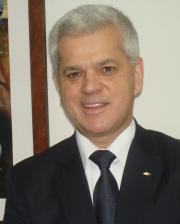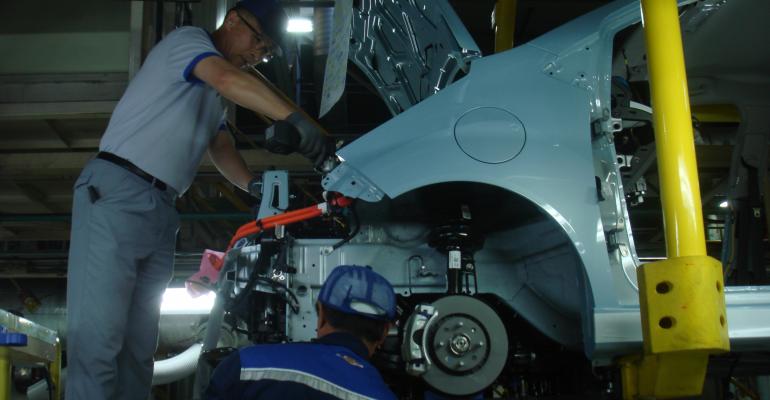
INCHEON, Korea – There’s a story Sergio Rocha likes to tell about one of his early hiring decisions in South Korea, which clearly paved the way for the employee-friendly style he now exercises as president and CEO of General Motors Korea.
Back in 2007, when he served as vice president-product planning and program management for the General Motors subsidiary, known then as GM-Daewoo, “I promoted one female – I still have her name on my mind – to a manager position and then the release went out,” Rocha tells WardsAuto during an interview at company headquarters in Incheon.
The next morning, his narrative goes, two company directors entered Rocha's office, one asking pointedly if the employee in question had been promoted to manager.
After Rocha affirmed the promotion news, the visitors responded first by noting women did not lead people in Korean society and, second, what Rocha did was “not correct” and he needed “to fix this.”
The native Brazilian executive recalls first needing to “count up to 20,” after which he told the two men he wasn't “going to reverse anything here, because it was well-thought out and went through the HR process...she competed, she was better than the others. She did not get promoted because she wears trousers or a skirt.”
Then, Rocha says, he suggested his visitors “start respecting” the new female manager because there was a “big chance” they'd be reporting to her in the near future.
Seven years later, after leading GM’s global program management operation in Detroit for two years and helming GM Argentina, Uruguay and Paraguay for another three, Rocha is back on the Korean Peninsula, continuing to buck longstanding business and cultural norms with programs that promote:
- Stepped-up communication between company employees and management, including periodic roundtables that feature the CEO himself reviewing past performance and upcoming goals.
- A merit-based advancement process unencumbered by sexism or other societal biases.
- A greater level of idea-sharing and cooperation with labor unions.
Though efforts by GM Korea to establish more workplace openness didn't start with him, they’ve been punched into a higher gear by Rocha, a 40-year industry veteran who identifies himself as one of the “Car Guys,” the generation of auto executives who guided GM through the mid-20th century and have been described by Bob Lutz, the former vice chairman of GM North America, as charismatic leaders who were passionate about the auto industry and focused on exciting the buying public with innovative designs and quality craftsmanship.
As an engineer first and foremost who “loves numbers...numbers talk by themselves,” Rocha asserts GM Korea’s production since its founding shows its office outreach efforts are paying off.
While the automaker reported sales of 377,000 units during its initial fiscal year, it sold 1.9 million last year.
In 2002, GM Korea produced 566,000 powertrains, including engines and transmissions, whereas last year it reported 2.5 million.
Over the past 12 years, Rocha says, GM Korea has produced more than 18 million units for GM; what's more, the company was directly and indirectly responsible last year for an estimated 40% of all Chevrolet-brand sales worldwide.
“When we got here,” Rocha says, the former Daewoo was exporting product to 80 countries, compared with 150 today.
GM Korea has grown from 8,300 employees in 2002 to an estimated 19,000 today, while job satisfaction within its employee ranks rose from 17% two years ago to 42% this year – still below the worldwide average, but the highest improvement rate logged by any GM company globally.
“We have more to do,” Rocha says, explaining he and his management team are planning a number of localized activities and initiatives, based on employee feedback.
“We’re trying to take the pulse” and see “what’s going on...what we need to do to take this organization to the next level,” he says.
Making Peace With Pugnacious Unions
Amid the progress GM Korea has made within the workplace, Rocha contends he’s most heartened by his team’s successes negotiating with the labor unions, which are relatively new in relation to those in other countries, but already are known as fiercely militant.
Labor strife led GM Korea to suffer a production loss of 48,000 units during Rocha's first year on the job and 35,000 units in his second. Into his third year, the automaker says, no units so far have been lost to labor unrest.
Rocha’s team successfully avoided a work stoppage when 55% of GM Korea union members voted in July to support an offer that included 10.5 million won ($10,200) in bonuses and incentives for each employee and a 3.3% raise in base pay, as well as a plan to rework the basic wage structure.
In connection with the agreement, according to a report by Reuters, the company also reversed an earlier decision not to produce the next-generation Chevrolet Cruze in Korea.
However, Annalisa Bluhm, a GM spokeswoman for the Cruze line, tells WardsAuto there has been no official announcement about where the new ride – due to be rolled out in 2017 – will be built, and a final decision probably won't be made public until third-quarter 2015.
Earlier in this year’s negotiation process, Rocha warned GM Korea likely would have to cut production if workers opted to strike.
“If you ask me, am I totally pleased with the labor union-company management relationship? No. Much more to be done...but definitely moving to the right direction,” Rocha says, adding he doesn’t necessarily credit the automaker’s concession packages with improving relations with union reps.
That’s because competing automakers offered their unions more “on the bargaining table, cash-wise, bonus, compensation,” he contends. At GM Korea, the unions seem to be open to the logic behind the concepts of competitiveness and sustainability.
“We’re telling them openly, without being arrogant...if we’re not competitive, we’ll not be sustainable,” Rocha says. “We can look at North America, the UAW...we have already seen the history of other unions around the world, what has happened. This is a boomerang.”
Rocha asserts he’s been able to break through the perceptual walls separating GM Korea management and union members thanks to the kinship he feels with employees assigned to the assembly line – because that’s where he started his career at 14 years of age, as an hourly apprentice working the plant floor.

“I speak their language,” he says, adding employees who feel they are heard and respected can make a much more energized workforce.
Still, despite making such communication inroads with labor representatives, Rocha contends, “one thing that concerns me a lot in Korea is labor cost.”
Concerns over such expenditures have contributed to ongoing speculation by industry observers and media that GM Korea soon may prove no longer viable and the parent company will decide to pull out of the country, shifting operations to regions such as China and India, where labor costs are considerably lower and the opportunity for market expansion is high.
Rocha, however, sees GM Korea’s labor woes as a potential step ahead of the strife developing markets are expected to face over the next several years.
In the same way Japanese automakers learned 20 to 30 years ago how to work with labor groups and American manufacturers learned before that, Rocha suggests, Korea over the past 10 years or so has experienced the birth pains of its own labor-relations efforts.
Similarly, in India and Thailand – where current labor costs are roughly half those in Korea – automakers will have to develop their own relations with labor interests over the next decade, he says.
“You can say, number one, that the technology here is much better developed than in India. We agree on that. The quality, we agree on that. The technical execution, we agree on that.
“But those are factors that that Japanese learned...the Koreans learned it as well, the Chinese are learning, and fast, and the people in India will be learning tomorrow and maybe next decade, the people from Africa will learn,” Rocha notes. “If the Koreans lose their competitiveness...the labor cost in Korea, the whole country,” could skyrocket 50% in the next five years.
“This is what I'm telling the union,” Rocha says, “this is what I'm telling my employees: ‘I’m not here to pay you less. If you want to make a 5% salary increase every year on the base wage, bring the productivity 6% up, so you offset your labor costs through productivity, (then) we are good.”
“But, if you want 5, 5, 5, 5 (percent) and your productivity is 3, 2, 4, 3 (percent), soon you'll be shooting” both your feet, he continues.
It’s imperative for Korea’s automakers to work on improving their labor situation now, to avoid further problems tomorrow, Rocha reiterates.
Not Going Away
For much of the past decade, GM Korea – which has combined GM's global reach with the small-car technological expertise of the former Daewoo – has been considered a successful venture, accounting for more than an estimated 20 % of GM's annual worldwide production of about 9.5 million vehicles.
But GM Korea’s labor cost per vehicle has been estimated at $1,133, according to both company and labor officials, compared with the average $677 per vehicle across GM's global operations.
After GM Korea lost two labor-related suits in 2012, it was ordered by a court to recalculate worker wages with the inclusion of bonuses and to provide the resulting three years of back pay.
The automaker has appealed the ruling to the Supreme Court, but has set aside 814 billion won ($746 million) to settle the unpaid-wages claims, just in case the appeal fails.
GM Korea officials say the contingency reserve caused a loss of 340 billion won ($307 million) in 2012, but the automaker rebounded to post a 1.1 trillion-won ($1 billion) profit last year.
GM spokesman Haeho Park notes in a previous WardsAuto report the automaker has not strayed from its plans to invest 8 trillion won ($7.3 billion) in capital for new product, equipment and research and development over the next five years, a 60% increase over the previous investment targets.
A stellar example of GM Korea’s stepped-up investment is the company’s improved design center, built for an estimated $40 million. One of seven fully integrated design, engineering and manufacturing operations within GM, the Korean facility is the third largest after those in the U.S. and Brazil.
Having contributed to the development of GM’s top-selling models, including the Chevrolet Spark, Aveo and Cruze, the re-worked Korean site houses about 200 employees and has received Leadership in Energy and Environment Design certification from the U.S. Green Building Council, in keeping with GM’s global environmental design practices.
GM Korea expects to continue rolling out new and redesigned vehicles, including a diesel-powered Malibu, and an all-new vehicle lineup and new powertrain are slated for 2015, Park says.
WardsAuto reported earlier this year the 250,000-vehicle-capacity Gunsan plant, which produces Cruze, Orlando and Lacetti models, was operating at 60% capacity. GM Korea has explained the under-utilization as the result of an effort to balance resources throughout the company. Park dismisses rumors Gunsan will be closed soon.
Meanwhile, the two plants in the Bupyeong district of Incheon are running at capacity, rolling out the Malibu, Captiva, Alpheon, Opel Mokka, Traxx and Encore. The plant in Changwon, which produces the Spark and Spark EV, has been running above capacity since restarting production of the popular Damas and Labo mini delivery vehicles.
Rocha is hopeful GM Korea and its competitors will discover the strategies they need to keep their employees motivated and production expenses manageable. Then, he speculates, the story of GM Korea ultimately will continue a successful one.
While Rocha believes the progress of GM Korea was anticipated, because “we ended up investing and every single investment here got approved,” it also exceeded many of GM’s initial market predictions.
“I think,” he says, “GM Korea was in this past decade a positive surprise for the corporation.”





